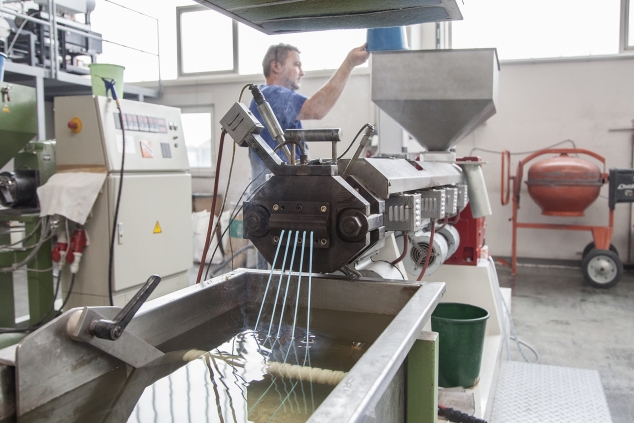Process Mechanic
Processes and raw materials under control: A process mechanic for plastics and rubber technology operates and controls the machines that produce plastic products. For some years now, this occupation includes the specialist area of “compound and masterbatch production,” which means a high level of involvement in masterbatch operation.
By carefully controlling and monitoring the production processes, extrusion, in particular, the process mechanic makes decisions regarding the quality of the masterbatch and is, therefore, also responsible for customer satisfaction.
The job
Once the application engineers, sales staff and colourists have done their job, the ball passes to the process mechanic. The process mechanic produces the pellet-shaped concentrate from the various components: a base polymer and different colourants and additives according to the formula developed by the colourist. They use extruders or, rarely, kneaders to disperse the molten components. By properly adjusting the production machines and carefully monitoring the production process, the process mechanic determines the quality of the resulting pellet. The process mechanic usually works in the production building, but also performs quality control tasks in the laboratory.
The skills
Great care and attention are required if the masterbatch is to achieve the high quality the customer expects. The process mechanic in the masterbatch operation must ensure that their machine is working with the correct temperature profile and the right speed. They need to know a lot about the components being mixed. Which polymer needs to be used at a higher temperature, which is processed at a relatively low temperature? Which pigment must be treated particularly gently as it loses its luminosity? Knowledge of chemistry and physics help when it comes to understanding the process. The process mechanic is fully competent in the techniques they use every day. They not only operate the machines, but also perform minor maintenance tasks. Needless to say, manual skills are required. The process mechanic is also responsible for production planning. An experienced process mechanic will usually progress to a position as shift supervisor or deputy.
The training
Process mechanics for plastics and rubber technology receive training that alternates between the factory and a vocational school covering seven specialised area. One of these, “compound and masterbatch production,” focuses on meeting the requirements of a masterbatch operation. There are no legal requirements regarding education, however, most trainees have an intermediate school leaving certificate, while some also have a certificate of secondary education or high school diploma. If you have talent and a proper education in physics, chemistry, mathematics and technology and are more of the “practical” type, training offers a good start in an exciting and future-proof industry.
 The process mechanic uses their knowledge of polymers, pigments and additives to adjust the machine.
The process mechanic uses their knowledge of polymers, pigments and additives to adjust the machine.
Trainee process mechanics become intensively involved in the use of polymeric materials and their processing techniques in each discipline in the field of plastic and rubber technology. Measurement, control and regulation technology, the handling of technical documentation and the planning of workflows are part of the training plan. In the key areas of compound and masterbatch production, the trainee learns the special process techniques that are later required to produce masterbatches and compounds: extrusion, in particular. Important aspect of training include the determination and evaluation of the chemical and physical properties of the starting materials and products. The issue of material recycling is becoming ever more important. The prospective process mechanic usually becomes familiar with other areas of the company within the course of in-company training, such as shipping and quality assurance.
In short
Training as a process mechanic for plastic and rubber technology with an emphasis in compounds and masterbatches is a relatively recent possibility.

In view of the complexity of the machines, an interest in technology and an ability to learn quickly are required.

As a machine operator, the process mechanic attends to extrusion and mixing systems and guarantees quality control.

Over the course of training, the process mechanic acquires basic knowledge about the properties of the plastics, colourants and additives to be processed.


